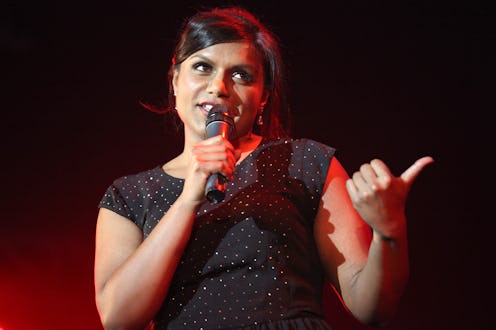When Salon accused The Mindy Project star and writer Mindy Kaling of being a Republican Wednesday, she hopped on Twitter to quickly correct the wrong assumption. And just like that, the court of conservative lady comics was dwindled back down to a few people and Victoria Jackson. If you tried to think of a few Republican comics of either gender, most folks would likely come up with one or two — and one of them would probably be Dennis Miller.
There are a few more like Adam Sandler, Drew Carey, and of course the Blue Collar comedy guys, but for the most part, comedians and comedy writers are a liberal bunch. And when it comes to women — an already underrepresented segment of the comedy community — conservative ladies are found almost nowhere in comedy unless you count Victoria Jackson, whose stunts have made her more of a laughing stock than a star.
Perhaps that's why Kaling was so quick to deny her conservatism, leaving Jackson alone in the bin of Republican ladies in comedy. But it got me thinking: Why are there so few Republican comedians and comedy stars? Can the Right not take a joke?
Not exactly. I highly doubt that only liberal viewers can enjoy hilarious moments — like Kaling falling out of a tree immediately after accepting a marriage proposal on The Mindy Project. No political leanings are necessary to see the humor in that. In fact, a great deal of comedy is just observational or situational. Unless you're watching Veep or The Daily Show or even 30 Rock, politics isn't exactly on the table for every joke. Being a liberal is not a prerequisite to enjoy comedy; why does it seem as if it's a prerequisite to create it?
Considering that comedy isn't exactly a science, there's no strict answer to the question, but rather trends and theories.
First, comedy is often a function of struggle, insecurity, and adversity. There's a reason that so many comedians' bread and butter is self-depreciation. No one wants to hear a joke about how you're so rich that you can swim through piles of money like Scrooge McDuck. It's far easier to laugh with someone who regales us with quips about wading through the poverty that plagues so many struggling comedians before they make it; terrible past jobs; or elaborate heists to secure free cable.
The rule applies to more than just money or power, of course. No one wants to hear a joke about a comedian's completely successful love life either. Still, comedy thrives on struggle, strife, and inequality: in most cases, the one percent (and by association Conservative thinkers) need not apply.
Social conservatism simply doesn't work for comedy. Especially in recent years, as the right has fought against things like social equality for people of all sexual preferences, women's health rights, and universal healthcare. Comedy is a medicine for social ailments, something liberalism fights to combat.
Next comes history. There is such a thing as the comedic tradition and while every funny person needs to find their own voice, not many people get there without following some of the greats. But looking back through history, George Carlin, Richard Pryor, and Carol Burnett inspired today's great funny minds like Louis C.K. and Tina Fey, who've in turn inspired folks like Kaling and other younger comedians. In the long line of funny people inspiring other funny people, there are few spots occupied by folks with conservative beliefs. Thus, the tradition of comedy is inherently left-leaning.
Finally, comedians really need to know their audience if they ever want to make money peddling jokes. And when seeking payment for funny lines, that audience is Hollywood in general. And Hollywood, in general, is a pretty liberal place.
In fact, there are plenty of Republican bloggers who rant about just how far left most of Tinseltown is and some thinkers who pen lengthy features in New York Magazine about the issue. We get it: movie stars lean left. Therefore, when looking for people to promote, cast, and make piles of money off of, it's no wonder that film-makers, TV producers, and the purveyors of every Hollywood medium seek out folks they understand and folks who understand them.
Comedians often aim to get at the real truth through comedy (case and point, every joke on The Daily Show and practically everything that comes out of Louis C.K.'s mouth), and a great deal of the friction between liberals and conservatives stems from the notion that the two groups believe in contrasting, socially relevant truths.
The Hollywood system consistently breeds more liberal comedians than conservative ones. The incredibly incestuous comedy world, glued together by friendship and mutual interests, is simply built that way.
So did Kaling really need to announce her refusal to lean right immediately after Salon got it wrong? Certainly not. Lucky for her, the liberal bias in the comedy world doesn't really apply once you've made it — as Kaling certainly has.
Still, considering the long line of liberal women in comedy, it makes sense that she'd want to defend herself; she's simply a lady who understands her audience.
